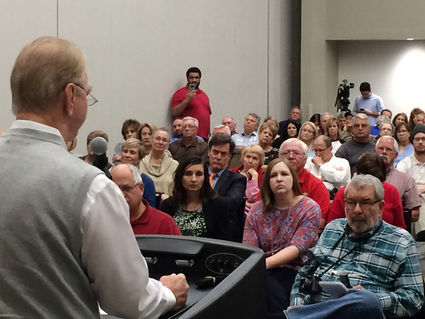Hospital district vote about health, taxes
Last updated 12/5/2017 at Noon
Dave Rogers
For The Record
Proponents of voting for the creation of the Orange County Hospital District heard their best speaker talk last.
Dr. Calvin Parker, an Orange native who was chief of staff at Baptist Hospital-Orange when it ceased in-patient care in 2015, took advantage of the question-and-answer period of last Thursday’s town hall at Lamar State Orange to speak.
He pointed out to the 200 interested citizens who squeezed into a meeting room at the new Cypress Center how Orange now faces a shortage of doctors.
“We had every specialist here you could think of, other than open heart surgery,” he said. “Now my hometown is left with three family doctors, an internist, a plastic surgeon and a foot doctor.
“We’ve seen every specialty drift, drift, drift away. Without a hospital, young doctors will not come to this area.
“Before you know it, we’re going to be left with nothing.”
Early voting began Monday leading up to the county-wide Dec. 19 election day. Last Thursday saw the first of two town hall meetings at LSC-O. The second was held last night, Dec. 5.
Both Orange business owner Ross Smith, part of a group called Care for Orange County which sponsored the petition calling for the district-creating election, and David Covey, Republican Party county chairman, who spoke for the “Vote No” side, agreed Orange County needs a hospital.
The issue is not if we need a hospital,” Covey said. “The issue is how are we going to go about getting one.
“Can we afford this hospital?
“If this hospital election is successful, it will be a tax on you, your children, your grandchildren,” Covey said.
The town halls were put on by a group of younger voters to allow experts to explain the history of hospitals in Orange, the petition terms being voted upon, and the pros and cons of voting for a hospital district.
Stephen Brint Carlton, Orange County Judge since 2015, offered the background:
Baptist Hospital bought Orange’s hospital on Strickland Drive in 2008, he said. In 2013, it closed its maternity services; in 2015, it closed in-patient services; and in January, 2017, it closed its emergency room.
The closing of the emergency room left emergency patients with no local remedies.
By state law, ambulances are not allowed to transport patients to anything less than a full-service hospital. That means free-standing emergency care businesses in Orange, like Neighbors, Golden Triangle Emergency Care and Urgent Care, are not an option for those requiring emergency transportation.
“That got us looking as to what kind of opportunities were available,” the judge said.
He related that various civic leaders and citizen groups, such as Smith’s, had been investigating the question since at least 2015.
“City, county and other entities have spent the last two to three years trying to talk healthcare entities into coming to Orange,” he said.
“We’ve talked to numerous hospitals, from Beaumont, Houston and all the way to Tennessee.”
The consensus reply was that they would only consider Orange if there was a hospital district, because a hospital district designation would make them eligible for higher government reimbursements.
Also, they said the existing facility on Strickland – still owned by Baptist Hospital of Southeast Texas – was of no interest to them because it was too large to suit the modern health care model which promotes out-patient procedures whenever possible.
Carlton emphasized that although the terms of the petition call for the district to be called the Orange County Hospital District, Orange County government would not run it.
The board would be run by five unpaid board members, with an election each year to vote on half the members each time.
The ballot restricts the hospital district from setting a tax rate higher than 18 cents per $100 valuation. For a $100,000 home, that comes out to $180 per year, $15 per month, or the price of dinner for two at McDonald’s.
A study prepared in 2015 for the civic leaders suggested a 25-bed hospital would be the size building required for Orange County.
“As to the where it would be located, that’s unknown,” Carlton said. “The only way to get an answer is if the hospital district is formed.”
Covey, who lives in Mauriceville, pointed out that the Republican Party platform opposes creating new tax entities.
And, he said, there are too many unknowns.
“We need to do our homework and show how this will function,” Covey said. “Not some pipe dream, but the steps in concrete on how this will work.
“The burden of proof is on their side to show how this will work. We all agree a hospital would be nice, but” the answer is “not just passing a tax, where we don’t know what we’re getting.”
Smith, owner of Akrotex and Sabine River Ford, among several Orange businesses, said creating a hospital district was a necessary next step.
“Once you establish a hospital district, it gives you the ability to get answers,” he said. “The tax from Day One is going to be zero, because we don’t have any of this information.
“You need this [board]. The beauty of a hospital district is it gives you these people who you elect that can decide these things.
“Our goal is not to build a hospital. Our goal is to work with investors. With the district, it allows them to have additional funding that will attract them.”
Once board members begin to get answers from investors, they can then determine a tax rate between zero and 18 cents to assess taxpayers.
“If the tax rate is going to be zero until they know how much it’s going to cost, would Mr. Smith consider amending the petition to zero cents, and then putting forth a new petition then?” Covey asked Smith.
Carlton stated that legally that could not happen.
“This Dec. 19 election is going to happen,” the judge said. “If it fails, it fails.”
But Smith still replied to Covey.
“No. You’re not giving me a carrot,” he said, meaning investors would not talk dollars and cents negotiations until they had seen the color of the county’s money.
Dean Crooks of Orangefield, who last week announced he’s running against Carlton on the Republican primary ballot in March, urged voters to exercise caution.
“We don’t mind paying taxes as long as we’re getting something for those taxes,” he said, paraphrasing the earlier comments of former Orange mayor Essie Bellfield.
But Crooks had his own warning on the business side.
“It’s a snake eating its tail,” he said. “When you start giving money to these entities, they want more and more money.”
Smith interjected:
“One of the things that attracted me to the hospital district is that it will be controlled by the people of Orange County,” and not an out-of-state corporation.
“What I’m saying,” Crooks went on, “is we need to be sure we’re getting what we spend money to get. I’d sure hate to pay that money and die any way.”
Covey said he didn’t like the “fear tactics” used by those saying people could die without access to a local hospital.
But many in the audience, which appeared about evenly split between those leaning for and against the district, repeatedly discussed the consequences of no local hospital.
“I’d rather spend my money making sure we have something that’s going to take care of the people here,” said Terrie Salter, a longtime nurse and member of the Orange city council.
“Think about yourself. Do you love yourself? Do you love your family? You have to think about that. We’re talking about taxes. I’m talking about death. I’m talking about your life. You have to think about that.
“If this hospital district is what we need to do to start somewhere, we need to start somewhere.”















Reader Comments(0)